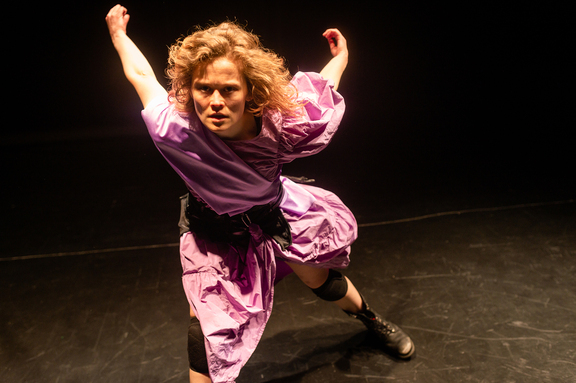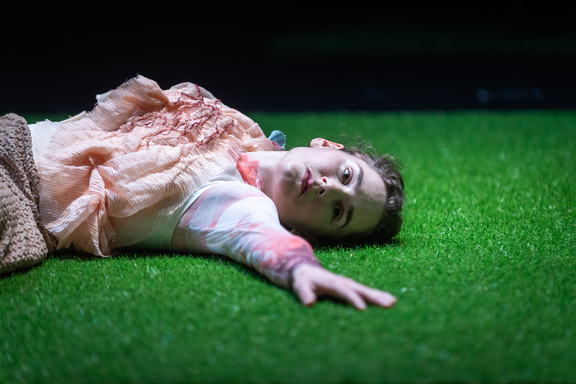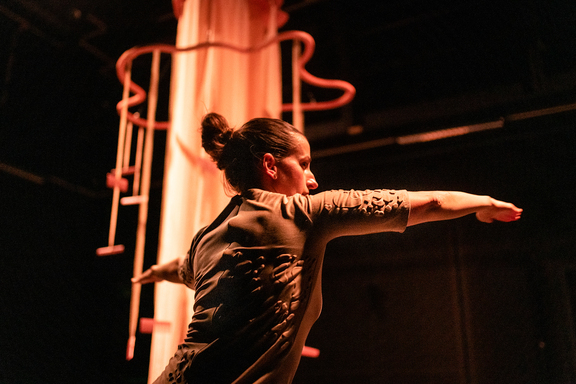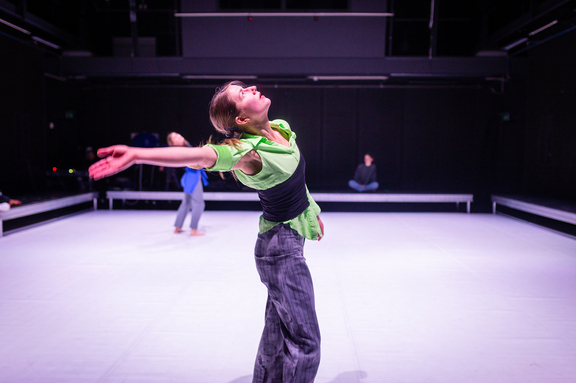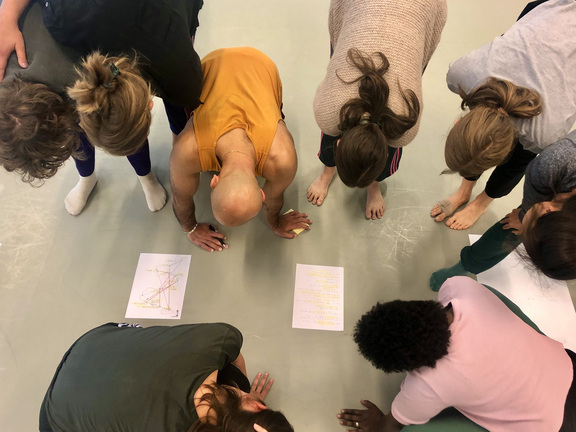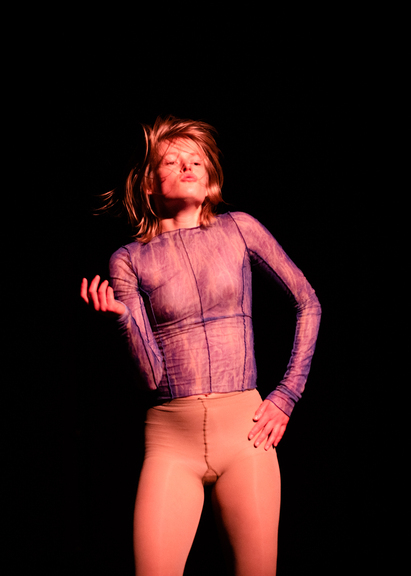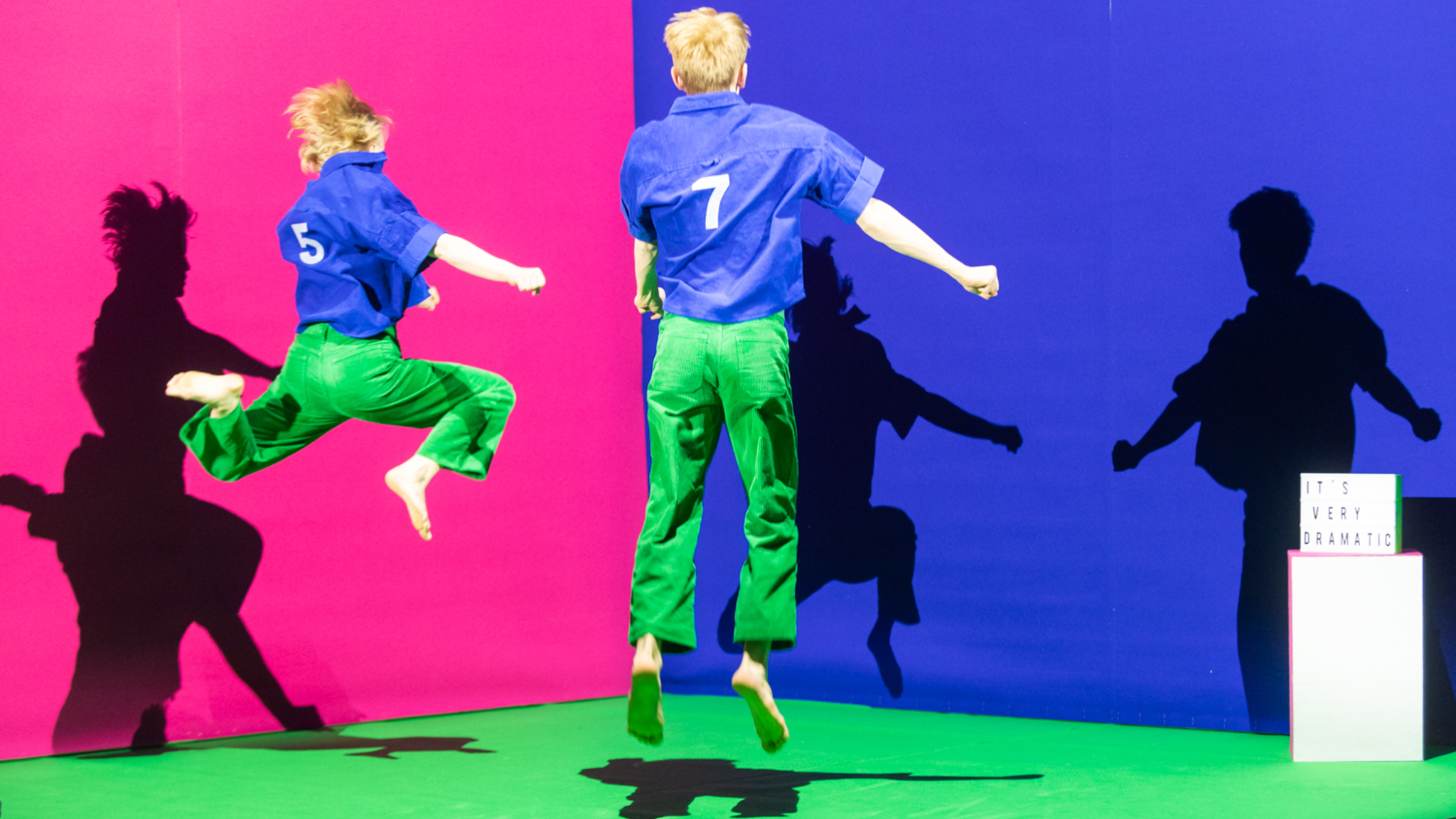

Master's programme in Dance
Are you passionate about embodiment and corporeal literacy? Would you like to develop your agency as a dance maker and performer? Become a Master’s student in Dance.
At KHiO we are looking closely at the process of transition from the dancer as a craftsperson to the dancer as an artist and performer. Studying dance includes dance skills but it also involves reflection and articulating agency as a dancer. Dancers are artists whose practices and competencies shape the creation of performances, exhibitions, and other forms of expression across art, culture and everyday life.
The study provides theoretical perspectives that illuminate the art of dance as a cultural expression in aesthetic, dance historical, political, ethical and social contexts. In the study, we look at how thinking about art can interact with practical art production and vice versa.
The workshops and courses involve areas such as Movement Practice, Performing and Creative Method, Project and Performance Practice, Performance and Critical Theory. During their studies, the students are provided with facilities and time to develop an MA graduation project, which ranges from performance to other possible formats of presentation.
To give you a flavour of the programme, the workshops and courses involve areas such as corporeal literacy, creative methods, performance skills and daily physical practice; memory, history, and the archive; critical theory and dramaturgy; introduction to social choreography, feminist and decolonial art and social practices; performance scores and choreographic poetry.
Subjects are addressed in various ways such as workshops and study trips, lectures and seminars, projects, and performances. Teaching takes place in groups and through self-study – in continuous dialogue with teaching staff, other students, research fellows and guest teachers.
With an intake of just 5 students, major emphasis is placed on individual tutoring and on adapting the programme’s content to individual needs. We value versatility in techniques, diverse backgrounds of physical training and diverse performance cultures; cross-disciplinary exchanges at different levels of artistic development (BA, MA, Ph.D); providing conditions for experimentation in safe space that does not tolerate sexism, racism, ableism, and other kind of discrimination.
The programme collaborates closely with the master's programme in choreography and other study programmes across departments and disciplines, both at KHiO and at other institutions (e.g. Norwegian Academy of Music).
The unique facilities at the Academy of Dance provide excellent working conditions and professional standard stage experience. Students also have access to a large library in the fields of performing arts and visual arts.
The programme offers methodical and professional skills in dance, dramaturgy, critical and performance theory and a national and international network. It also prepares students for research and applying to the PhD programme in Artistic Research and other relevant doctoral programmes.
The pool of teachers that have taught since 2015 are: Heine Avdal, Olive Bieringa, Linda Blomquist, Jonas Kure Buer, Jonathan Burrows, Theodor Barth, Joaquim Bigas Bassart, Bojana Cvejić, Lisa Dillan, Charlotte Engelkes, Mette Edvardsen, Anne-Grete Eriksen, Ingri Fiksdal, Nikolaus Gansterer, Elisabeth Gmeiner, Rosalind Goldberg, Lene Grenager, Deborah Hay, Marius Holth, Solveig Styve Holte, Rana Issa, Siri Jøntvedt, Yuko Kaseki, Tor Lindstrand, Janne-Camilla Lyster, Roza Moshtaghi, Vera Nevanlinna, Chrysa Parkinson, Anders Paulin, Manuel Pelmus, Marta Popivoda, Nikolina Pristaš, Per Roar, Torunn Robstad, Eszter Salamon, Yukiko Shinozaki and Mike Sperlinger.
Programme description
This programme description is valid from the Autumn semester of 2023.
Brief programme description
The Master’s Programme in Dance is a two-year full-time study that builds on a performing Bachelor’s degree in dance or an equivalent education. The programme is a postgraduate specialist study intended for students who want to work as independent dance artists at an international level. The programme aims to develop and stimulate the students’ artistic identity as performing and creative dance artists by developing their performative articulation and reflection in both individual and collaborative projects.
The programme provides perspectives that illuminate the art of dance as a cultural expression in aesthetical, historical, political, ethical and social contexts and looks at how theories of art may interact with the practical production of art, and vice versa.
The Master’s programme will qualify students to work nationally and internationally either as an independent dancer or in established dance companies, as well as in other contexts within the arts and society.
The programme corresponds to 120 ECTS credits and qualifies students for admission to the PhD in Artistic Research and other relevant doctoral programmes.
Admission requirements
The Master’s degree programme is based on a three-year Bachelor’s degree (180 ECTS credits) in dance or other relevant education. Applicants must document a minimum of 80 ECTS credits within dance and the performing arts. Applicants with a lower content of dance-related or performative subjects in their degree may also apply for admission if they can document through practice/work experience that they have attained a corresponding scope and level in regard to the programme.
In exceptional cases, other documented qualifications may be approved as wholly or partially equivalent to the educational requirements specified above.
Applicants must document their proficiency in English, for example through a TOEFL test with a minimum score of 500, an IELTS test with a minimum score of 5.0 or other equivalent documentation. Applicants who document an educational background from another Nordic country or from an English-language country do not need to submit further documentation of their proficiency in English.
Applicants must submit 1) a letter of motivation and 2) Vimeo uploads (or equivalent documentation) where they act as a performer. On the basis of their application, applicants will be informed whether they will be called in for an admission test and interview.
The admission process will be based on an overall assessment of the applicant in regard to
- their description of and reflection on practising as an independent dance artist
- expressiveness, individuality and creativity within dance
- technical skills within dance
- motivation
- personal suitability.
Learning outcomes
The Master’s degree programmes learning outcomes are described as follows:
Knowledge
Upon completing their education, students shall
- have extensive knowledge of tools and methods within performative dance in historical and contemporary contexts.
- be able to demonstrate knowledge of current perspectives and concepts that are relevant to work related to the art of dance.
- have knowledge of the connection between a sustainable performing enterprise, project development and the field’s infrastructure.
Skills
Upon completing their education, students shall
- be able to integrate movement skills, qualities and reflection in an articulated and independent dance performance.
- be able to use relevant methods when encountering complex artistic challenges and in independent artistic research and development.
- be able to master the field’s concepts, communicate and analyse relevant problems, and relate critically to various sources of information.
General Competence
Upon completing their education, students shall
- be able to act as independent dance artists at a high level and be able to contribute and develop the field.
- be able to demonstrate good collaborative skills in artistic work processes in line with current workplace and professional ethics.
- be able to articulate and carry out independent artistic projects and research and development.
Structure and progression
All the courses in the curriculum support, develop and lay a foundation for the professional competence the students will need later during their professional careers.
The programme’s academic content has been divided into the following courses:
Year 1:
- Movement Practice 1
- Performing and Creative Method 1
- Project and Performance Practice 1
- Performance Theory and Philosophical Aesthetics 1
- Independent Project Proposal
Year 2:
- Movement Practice 2
- Performing and Creative Method 2
- Project and Performance Practice 2
- Performance Theory and Philosophical Aesthetics 2
- Independent Project
ECTS credits are used to indicate the scope of the study/work required by the programme’s courses. 60 ECTS credits correspond to a year of full-time study. One ECTS credit corresponds to 25 to 30 actual hours of work by the student.
Actual hours of work include teacher-led instruction, lectures, thesis writing, seminars, independent studies, etc. Some courses may rely heavily on teacher-led instruction, while other courses are geared more towards the students working on their own.
Exchange
Students at the Oslo National Academy of the Arts have the opportunity to participate in an exchange programme at another institution of higher education during their studies. Students at the Master of Dance programme may participate in such a programme during semester 2 or 3.
These exchange agreements are valid for master's programme in dance:
Teaching and learning methods
The education is based on art-, research- and experience-based knowledge and is part of the artistic development at the Oslo National Academy of the Arts. This development is critically reflective and based on the disciplines’ autonomy within a changing society.
The programme consists of teacher-led instruction, supervision and independent work. Collaboration is central to certain parts of the programme. The working methods may consist of physical training and creative/exploratory work on dance, practical assignments, group criticism, written assignments, lectures, seminars, demonstrations, independent study, project work, work placement, performances, excursions, exhibitions, talks and concerts.
The teaching takes place in groups and individually, and the focus is on the individual student’s development. Taking responsibility for and reflecting on one’s own learning are central to the programme. At the same time, the programme also greatly emphasises the individual student’s responsibility for the group’s progression and for seeing the performing arts as a collective art form. Experience in various forms of collaboration is therefore an essential part of the programme. Projects, showings and performances are central to the programme.
The programme includes an independent artistic work (the Independent Project). This independent artistic work shall demonstrate reflection, understanding and maturation. The students themselves choose which area within the art of performative dance they want to specialise in. In connection with this work, the student will draft a project description and a bibliography of their own choice.
The programme’s coursework requirements are
- mandatory attendance
- active participation in the education and at seminars
- completion of all the mandatory assignments in each course
Further information on coursework requirements is available in the individual course descriptions.
The programme is adapted to students who only master English, so that all the courses can be completed, and all the academic choices can be made without the student mastering Norwegian.
Assessment
All coursework requirements must be fulfilled for the students to receive their final assessment in the given course.
The students’ work in the programme shall be supervised and assessed on an ongoing basis. Supervision and assessment are a continual process related to the programme’s learning outcomes and content. The ongoing assessment is based on teacher assessments, reflection on one’s own development and fulfilment of the coursework requirements in each course.
In addition to the ongoing assessments, a course may also be concluded with a written reflection, assessment of artistic results in a performance/exhibition or a practical demonstration related to the course’s learning outcomes.
The assessment usually takes place in cooperation between the student, teacher/supervisor and/or the programme coordinator. The Independent Project will be assessed by three examiners (two internal and one external).
See the course descriptions for further information on how each course is assessed.
The student must pass all the first-year courses to progress to the second year. All the programme’s courses must be passed for the student to achieve the degree of Master of Dance.
The programme uses a pass/fail grading system.
Quality assurance
The Oslo National Academy of the Arts has systems for assuring and enhancing the quality of all parts of the education. Students are important contributors to this work, for example by participating in student evaluations and the annual learning environment survey.
Course structure
| Course code | Course name | ECTS Credits |
|---|---|---|
| DA501 | Project and Performance Practice 1 | 15 |
| DA502 | Movement Practice 1 | 10 |
| DA503 | Performing and Creative Methods 1 | 15 |
| DA504 | Performance Theory and Philosophical Asesthetics 1 | 10 |
| DA540 | Independent Project Proposal | 10 |
| Course code | Course name | ECTS Credits |
|---|---|---|
| DA511 | Project and Performance Practice 2 | 5 |
| DA512 | Movement Practice 2 | 10 |
| DA513 | Performing and Creative Method 2 | 5 |
| DA514 | Performance Theory and Philosophical Aesthetics 2 | 5 |
| DA550 | Independent Project | 35 |
Admissions
There are no plans for admitting students to master's programme in dance the coming year.
About the Academy of Dance
The Academy of Dance was founded in 1979 as the National College of Ballet and Dance (Statens ballettskole). Since 1996 it has been part of Oslo National Academy of the Arts (Kunsthøgskolen i Oslo), which brings students of different disciplines together to form a broad, international community of arts and artistic skills. The unique facilities at the National Academy of the Arts, including well-equipped stages and studios, mean that students at the Academy of Dance have excellent opportunities to develop in a state-of-the-art working environment.
